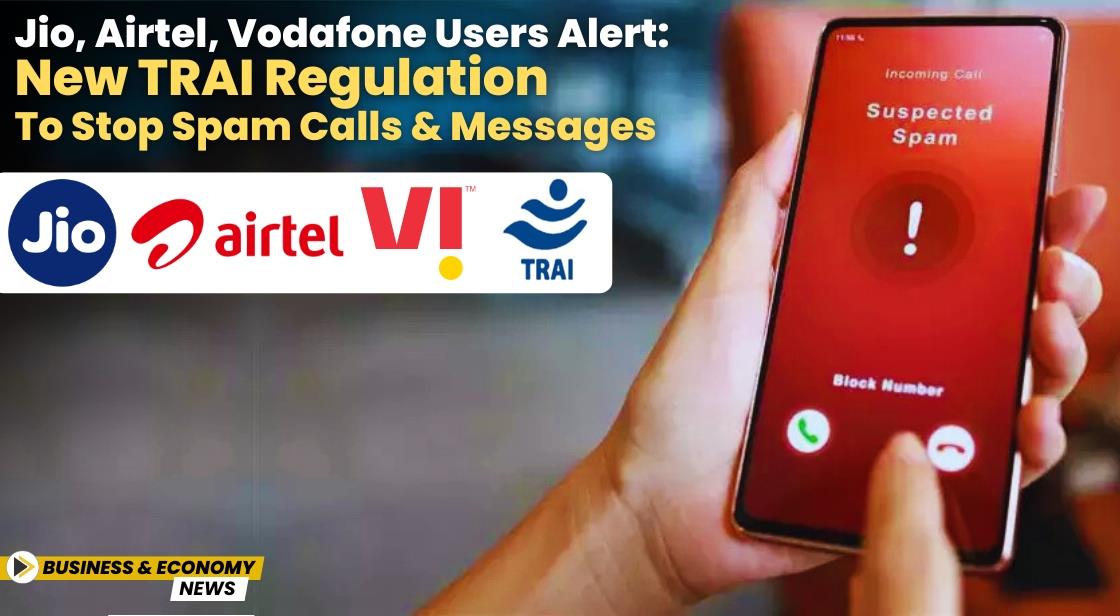Jio, Airtel, Vodafone Users Alert: New TRAI Regulation to Stop Spam Calls and Messages

News Synopsis
Spam and fraudulent calls and messages have increasingly become a major nuisance, and, more importantly, a security threat for mobile users across India. In response, the Telecom Regulatory Authority of India (TRAI) has introduced a groundbreaking regulation aimed at significantly reducing spam and fraud for users of major telecom providers, including Jio, Airtel, Vodafone, and more.
This new rule mandates strict verification processes for commercial messages and calls, helping millions of users stay safe from potential scams and unwanted disruptions.
TRAI’s New Regulation to Curb Spam and Fraudulent Messages
TRAI's latest regulation is designed to protect mobile users from the constant barrage of spam messages. Under this regulation, telecom operators and brands that send commercial messages containing links, attachments, or other promotional content will be required to register and verify all of their content before it is sent to customers.
According to TRAI, "the companies or any brand sending commercial texts, which include URLs, APKs, OTT links, or any file attachments, will need to register their content with telecom giants before they share it with customers." Only once the information has been verified will it be distributed to users.
In cases where verification fails, the messages will be blocked via a secure filtering system. This proactive measure allows TRAI to establish a shield that stops unverified and potentially malicious messages before they reach mobile users.
Enhanced Message Traceability
To further boost security, Telecom Regulatory Authority of India (TRAI) has implemented an enhanced message traceability feature. This initiative involves defining a Principal Entity (PE)-Telemarketer (TM) chain, through which all messages must pass before reaching an Access Provider. This way, every promotional message has a clear and traceable source, allowing TRAI to maintain higher accountability across the messaging chain.
In cases where PEs and TMs fail to adhere to the specified chain, TRAI has mandated that Access Providers issue daily warnings to non-compliant entities until November 30, 2024. This strict enforcement policy is expected to encourage greater compliance among telemarketers, creating a more secure environment for end-users.
TRAI’s Rules Against Spam Calls
In addition to addressing spam messages, TRAI has rolled out stringent measures to curb spam calls. As of August 13, TRAI has mandated that any entity found making unauthorized promotional voice calls will face serious consequences. These may include up to two years of blacklisting and a restriction on receiving new resources during this period.
So far, more than 800 entities and individuals have been blacklisted, with TRAI stating that over “18 lakh SIP DID/Mobile Numbers/Telecom resources have been disconnected.” To further bolster monitoring, TRAI has transitioned all telemarketing calls that begin with 140XX numbers to the blockchain platform.
This system, which was fully implemented on October 1st, will allow TRAI to maintain full monitoring control over telemarketing calls, ensuring tighter regulations.
Protect Yourself: Tips for Staying Safe from Spam
While TRAI’s measures will reduce spam, it is essential for mobile users to remain vigilant against potential scams. Below are a few critical tips to help keep yourself safe from fraud:
-
Avoid Engaging with Fraudulent Calls: If a call seems suspicious or makes unverified claims, stop interacting immediately and report the number.
-
Do Not Share Personal Information: Never provide personal details or OTPs to unsolicited callers, even if they claim to be from an official organization.
-
Verify Links in Messages: Avoid clicking on links from unknown senders. If the message claims to be from a reputable source, verify the sender’s identity first.
Conclusion: A Safer Mobile Experience Awaits
TRAI’s new spam regulations will provide Jio, Airtel, Vodafone, and other telecom users with improved protection against unwanted calls and messages. This update is a significant step forward in protecting users from fraud, establishing a streamlined verification process for all commercial communications, and holding telemarketers accountable.
However, personal vigilance remains key to a secure mobile experience, so continue to exercise caution when dealing with unknown numbers or messages.
You May Like









